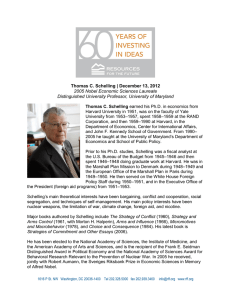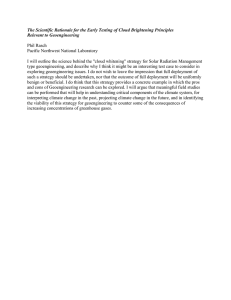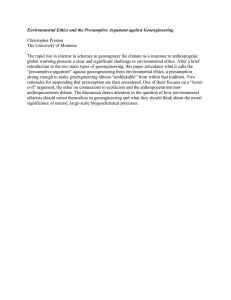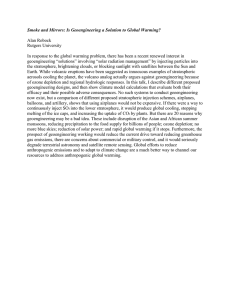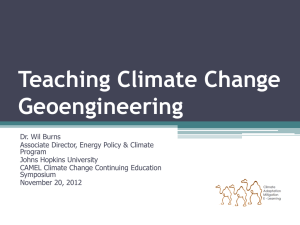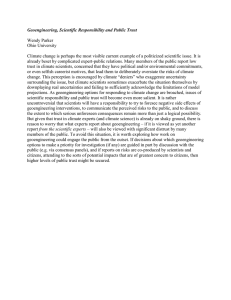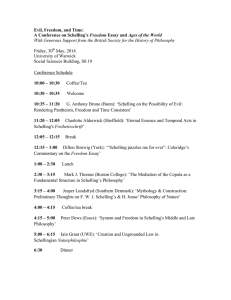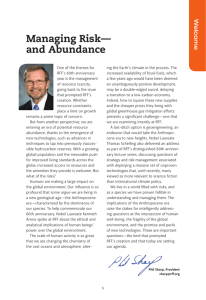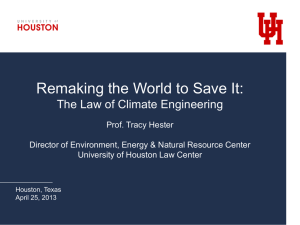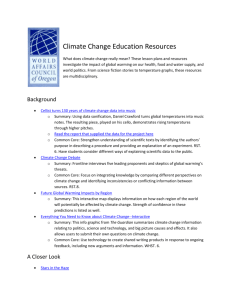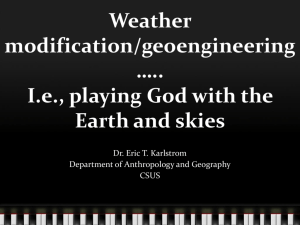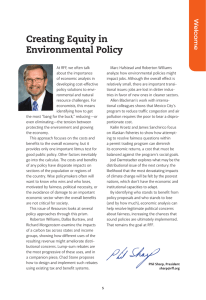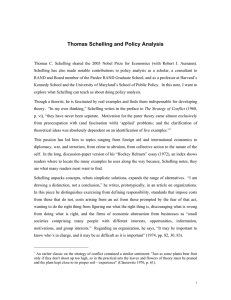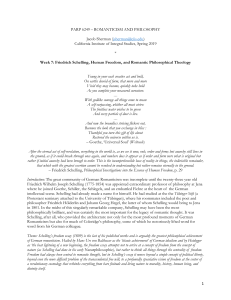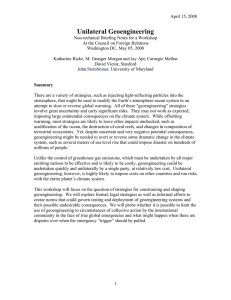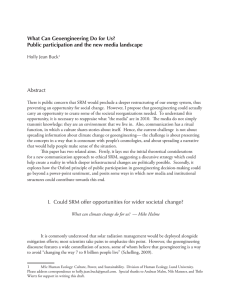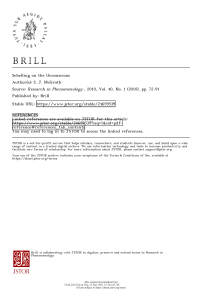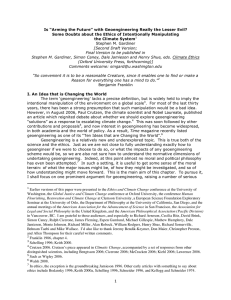ENVIRONMENTAL Stewardship The Obligations of
advertisement
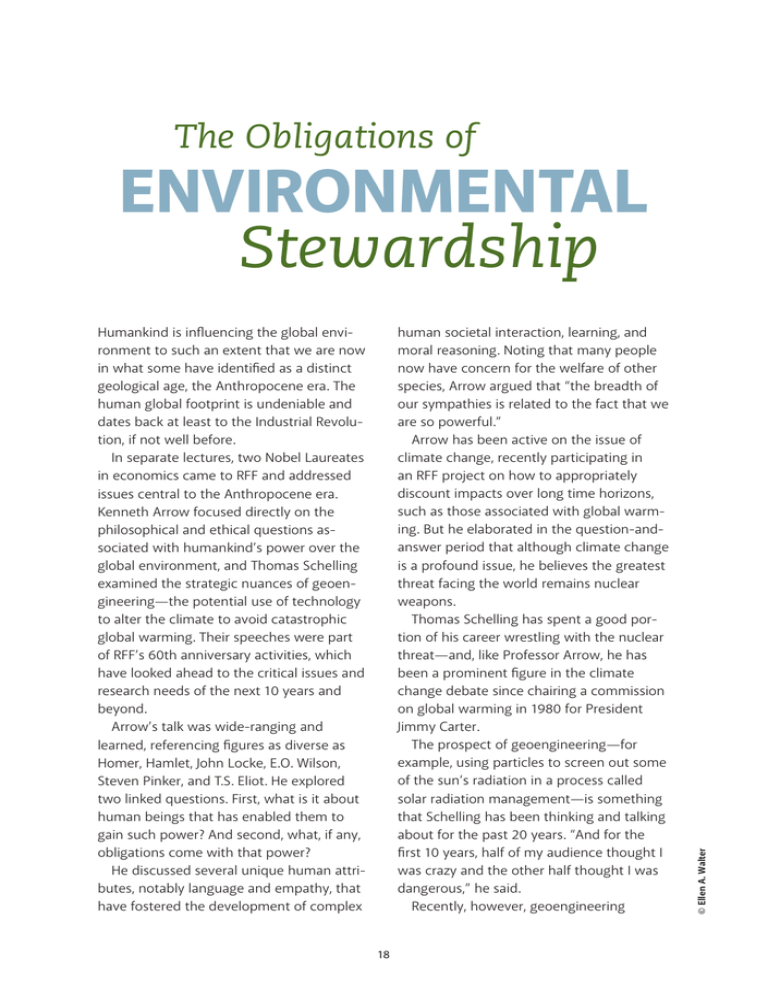
The Obligations of ENVIRONMENTAL human societal interaction, learning, and moral reasoning. Noting that many people now have concern for the welfare of other species, Arrow argued that “the breadth of our sympathies is related to the fact that we are so powerful.” Arrow has been active on the issue of climate change, recently participating in an RFF project on how to appropriately discount impacts over long time horizons, such as those associated with global warming. But he elaborated in the question-andanswer period that although climate change is a profound issue, he believes the greatest threat facing the world remains nuclear weapons. Thomas Schelling has spent a good portion of his career wrestling with the nuclear threat—and, like Professor Arrow, he has been a prominent figure in the climate change debate since chairing a commission on global warming in 1980 for President Jimmy Carter. The prospect of geoengineering—for example, using particles to screen out some of the sun’s radiation in a process called solar radiation management—is something that Schelling has been thinking and talking about for the past 20 years. “And for the first 10 years, half of my audience thought I was crazy and the other half thought I was dangerous,” he said. Recently, however, geoengineering Humankind is influencing the global environment to such an extent that we are now in what some have identified as a distinct geological age, the Anthropocene era. The human global footprint is undeniable and dates back at least to the Industrial Revolution, if not well before. In separate lectures, two Nobel Laureates in economics came to RFF and addressed issues central to the Anthropocene era. Kenneth Arrow focused directly on the philosophical and ethical questions associated with humankind’s power over the global environment, and Thomas Schelling examined the strategic nuances of geoengineering—the potential use of technology to alter the climate to avoid catastrophic global warming. Their speeches were part of RFF’s 60th anniversary activities, which have looked ahead to the critical issues and research needs of the next 10 years and beyond. Arrow’s talk was wide-ranging and learned, referencing figures as diverse as Homer, Hamlet, John Locke, E.O. Wilson, Steven Pinker, and T.S. Eliot. He explored two linked questions. First, what is it about human beings that has enabled them to gain such power? And second, what, if any, obligations come with that power? He discussed several unique human attributes, notably language and empathy, that have fostered the development of complex 18 © Ellen A. Walter Stewardship Nobel Laureates Kenneth Arrow (left) and Thomas Schelling (right) delivered distinguished lectures at RFF as part of its 60th anniversary celebrations. we can stop counting on it.” Such testing of solar radiation management, in particular, would be designed to answer the following questions, among others: »» How are the particles distributed? »» Do they concentrate more toward the equator or more toward the poles? »» How long does it take them to distribute throughout the atmosphere? »» Is it a ragged or uniform distribution? »» Do the particles dissipate in six months? A year? Eighteen months or longer? He walked the audience through a masterful analysis of the motivations of different political actors and concluded that the United States was in the best position to take the lead. Whoever initiates geoengineering experimentation is setting the framework for future efforts, noted Schelling, “and I trust the United States, not to do that especially well, but to do it probably better than anybody else.” has emerged as a topic for discussion in respectable company, both because it is a potential backstop against severe climate change and because it is increasingly feasible. The emergence of the geoengineering option raises troubling questions. First, as Schelling observed, “It looks phenomenally cheap. Compared with the arms race that we've had ever since the end of World War II, this is small stuff. This is likely to be within the individual capacities of maybe 20 different countries if they really wanted to do it.” Additionally, much remains unknown about the physics of geoengineering and its possible unintended consequences. And if for some reason it was deemed necessary to discontinue the solar radiation management strategy, for example, the atmosphere will have accumulated the capacity for a very sudden large increase in temperature. For these reasons, Schelling recommended moving beyond laboratory experiments to “gentle experimentation” in the atmosphere, “because if geoengineering is a very bad idea, the sooner we know, the sooner Visit www.rff.org/resources2020 to watch the Nobel Laureate lectures. 19
